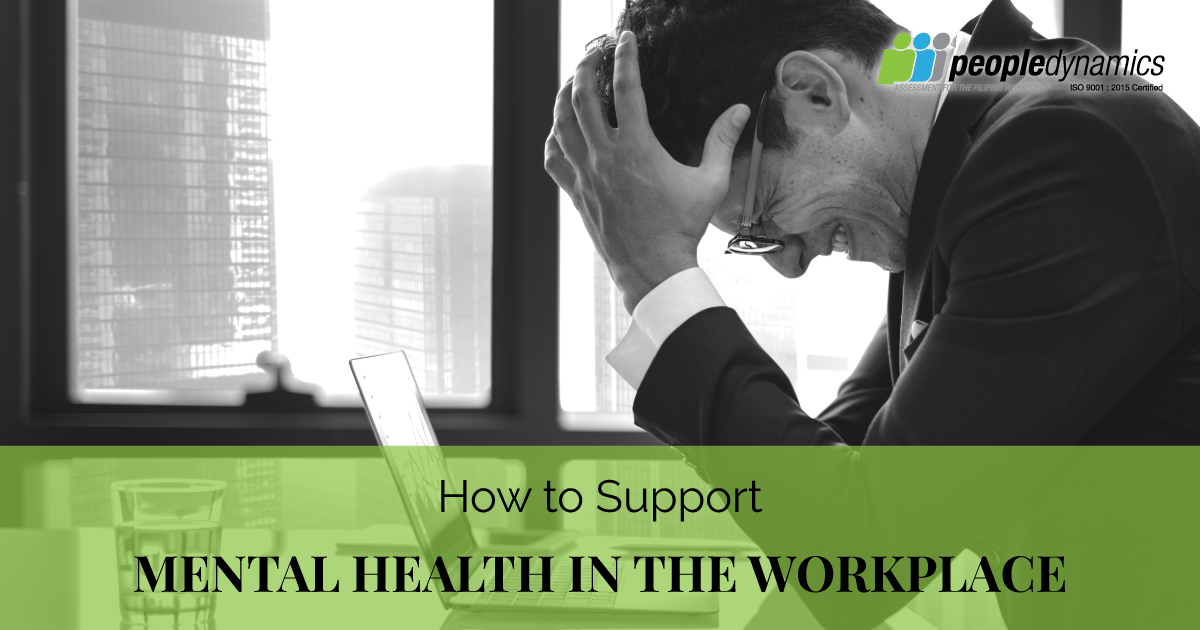Work is a major part of life. A working person works an average of 8 hours per day. And that’s not counting the time an individual spends preparing and getting to work, and the excess time they spend for overtimes. Because of this, it’s no wonder that work affects health. And that includes mental health. As an employer, how can you support mental health in the workplace?
Why should you care about mental health?
Before you learn how to support mental health in the workplace, you might be wondering why should you support it. According to the World Health Organization (WHO), 1 in 4 people will be affected by mental disorders at some point in their lives. In fact, around 450 million people worldwide are currently suffering from such conditions, making mental disorders among the leading causes of ill-health and disability globally.
For your employees and your organization
In a statement issued by the Philippine Department of Health (DOH) in 2019, they said that in the country, 3.3 million Filipinos suffer from depressive disorders, with suicide rates in 2.5 males and 1.7 females per 100,000. There are also other types of mental health issues with little to no data in the country. And unlike physical illnesses that have obvious signs plus the stigma about mental disorders, the numbers are likely more than what you could expect.
You supporting mental health in the workplace can help lessen the risk of your employees experiencing these illnesses. Remember that aside from work affecting the health of a person, health also affects work. If your employee is not well, it may affect their performance, therefore affecting your organization.
For government compliance
The Philippine government also recognizes the importance of addressing mental health. In 2018, the Republic Act (R.A.) 11036 also known as the “Mental Health Act” was signed, aiming to establish a national mental-health policy underscoring the basic rights of all Filipinos to mental health. In pursuant of this law, the Department of Labor and Employment (DOLE) also released Department Order No. 208-20, also known as the “Guidelines for the Implementation of Mental Health Workplace Policies and Programs in the Private Sector”. So, you supporting mental health in the workplace is not only for the good of your employees but also in compliance with the government.
5 Things You Can Do to Support Mental Health in the Workplace
Educate your leaders and employees about mental health
Ignorance and misinformation can affect a person’s way of tackling mental health. For a person who’s struggling mentally, support is crucial. But what if the person that they trusted and opened up to is ignorant or misinformed about their situation? Then they can’t get that support that they need. This can also factor in worsening the situation and drowning them deeper into their problems.
So, in your company, you must educate your leaders and employees about mental health. This will help in removing the stigma and the misinformation around mental health and the people suffering from it. Include in your education materials the signs they need to look out for and what they could do to support a person who’s struggling.
You can take this step further by helping your leaders and employees be emotionally intelligent. Emotions are so powerful that they can affect an individual’s thoughts, decisions, and behaviors. A colleague with poor mental health will have a problem managing their emotions, and if the people they interact with at work also let their emotions get the best of them, conflict will surely be on the way. Emotional intelligence helps a person better perceive, understand, and manage emotions in themselves and others.
Have wellness programs for your employees
If you’ve asked yourself if you should have wellness programs for your organization and want to support mental health in the workplace, the answer should be yes. Wellness programs are a holistic approach to promoting a healthy workplace—physically and mentally. Your organization’s wellness programs can be one of your greatest tools in this journey.
You have to remember though that a wellness program can only give you benefits if it fits your organization and your employees. And, if you’re like other organizations with remote employees, you have to consider how they could participate in your wellness programs.
Encourage open and inclusive communication
It can be hard for a person who’s struggling mentally to open up to others and talk about what they feel. This is especially true in the workplace where there’s an atmosphere of “professional matters only”. So, to help support mental health in the workplace, it’s good to encourage open and inclusive communication.
You could have open-door policies in place so that employees will be encouraged to talk to their leaders if they’re having problems. It’s also crucial that no employee feels isolated and left-behind. Start by acknowledging the importance of your employees’ views, listening to them actively, and engaging them.
Provide professional support if you can
Mental health illnesses are just like physical ailments—they need professional help. There are different forms of professional help for these problems that your employees can go to. Psychologists, psychiatrists, counselors, and therapists are only some of them. If you’re already providing your employees with medical insurance, why not take it a step further to include their mental health services?
Mental health systems in the Philippines are still fairly lacking, with 1 doctor for every 80,000 Filipinos. Economic conditions and inaccessibility of services also limit access to mental health care in the Philippines. Giving your employees the options to get professional help can alleviate their burden.
Let your employees take a break
It’s healthy to disconnect and recharge for work occasionally. It could even be as short as 5 minutes. As a leader or employer, you must allow your employees to take a break sometimes. Of course, you can be reluctant in letting them do so. You do compensate them for their work. But you have to realize that rest is also essential to productivity. No one can be and will stay productive for 24 hours a day. If you offer paid leaves, allow—and encourage—them to consume it.
As much as possible, be mindful of their time when they’re off work. When you constantly call them even during the times that they shouldn’t be working, you just give them more stress. This results in poorer mental health.
Your employees’ mental health can affect their performance. It’s a serious topic and should be supported especially in the workplace!




